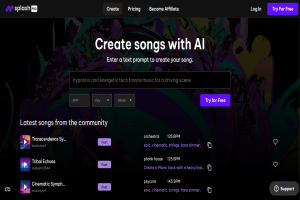Tool List
Top AI Tools for Music
AI tools for music revolutionize the creation, production, and distribution of music by offering tools for composition, production, and analysis. These tools can analyze music patterns, suggest melodies, and even generate entire tracks, opening up new creative possibilities for musicians. Costs for AI music tools vary, with some offering free versions or pay-as-you-go pricing while others charge monthly subscriptions from $5 to $50 or more. AI in music is beneficial as it enhances creativity, improves efficiency in music production, and enables new forms of expression, making it an exciting frontier in the music industry.
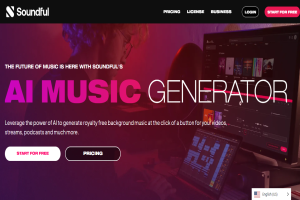
Soundful
Leverage the power of AI to generate royalty free background music at the click of a button for your videos, streams, po...
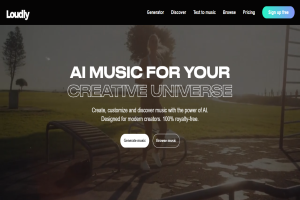
Loudly
Create, customize and discover music with the power of AI. Designed for modern creators. 100% royalty-free.
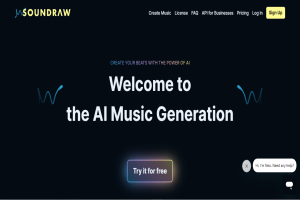
Soundraw
Simply choose the mood, the genre and the length. Our AI will generate beautiful songs for you
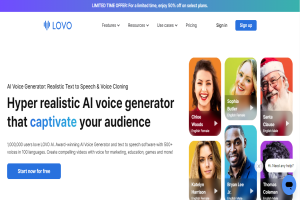
Lovo
1,000,000 users love LOVO AI. Award-winning AI Voice Generator and text to speech software with 500+ voices in 100 langu...
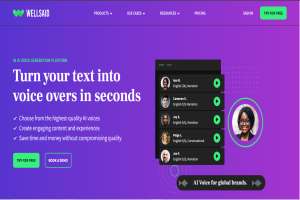
Wellsaidlabs
Control the tone, punctuation, and emphasis to convey your message using AI voices any way you like. You are the directo...
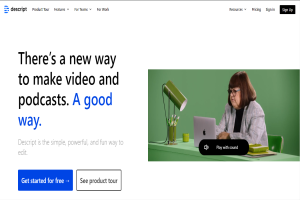
Descript
Descript is the only tool you need to write, record, transcribe, edit, collaborate, and share your videos and podcasts.
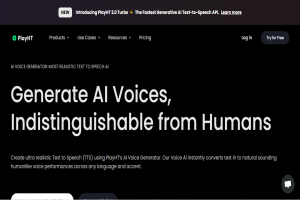
PlayHt
Create ultra realistic Text to Speech (TTS) using PlayHT’s AI Voice Generator. Our Voice AI instantly converts text in t...
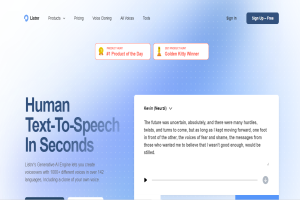
Listnr
Listnr's Generative AI Engine lets you create voiceovers with 1000+ different voices in over 142 languages, Including...
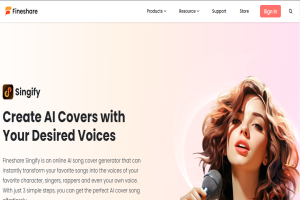
Fineshare
Regardless of your location, VoiceTrans allows you to communicate with friends in a fun and engaging way. You can transf...
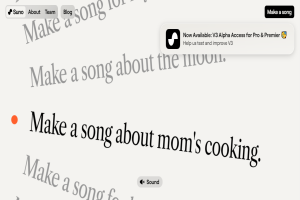
Suno
Suno is building a future where anyone can make great music. Whether you're a shower singer or a charting artist, we bre...
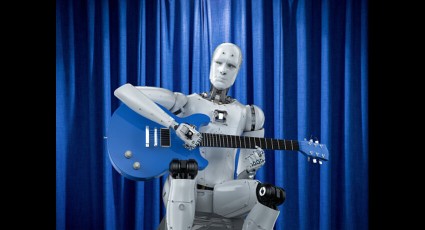
What are the Benefits of AI Tools for Music?
In today's fast-paced world, music producers and digital marketers are constantly searching for innovative ways to stay ahead. Wit...
Read MoreFrequently Asked Questions
AI tools for music are software programs that use artificial intelligence to assist with composing, arranging, producing, and performing music. These tools can generate musical pieces, enhance sound quality, and provide insights into music theory and composition.
AI tools can automate repetitive tasks, suggest chord progressions and melodies, enhance mixing and mastering processes, and even simulate the sound of real instruments, allowing musicians and producers to focus on creative aspects.
Yes, some AI music tools are capable of composing entire songs, including melodies, harmonies, and rhythms, based on genre-specific parameters or user input.
AI-generated music pieces can be unique, especially when the tool is designed to produce novel compositions rather than replicating existing music styles and patterns.
AI tools are trained on large datasets containing various music genres, which enables them to understand and generate music that fits specific genre characteristics.
Yes, many AI music tools can analyze your existing music and learn from your style to suggest or create music that aligns with your artistic preferences.
In music education, AI tools can provide instant feedback, offer adaptive learning pathways, and help students understand complex music theory through interactive examples and simulations.
AI tools can enhance live performances by generating real-time accompaniments, adjusting music based on audience reactions, and even controlling stage lighting and effects.
Users of AI music tools should be aware of the specific copyright policies associated with the tool, as the rights to the music created can vary from one platform to another.
Yes, several AI tools specialize in mixing and mastering by automatically adjusting levels, applying EQ settings, and enhancing sound quality to professional standards.
Some AI tools are capable of analyzing and mimicking the styles of famous musicians and music genres, though users must be cautious about copyright infringement when emulating well-known artists.
AI is increasingly used in music therapy to analyze patient responses to different music types and personalize therapy sessions based on real-time data.
Many AI music tools can integrate with traditional music production software through plugins or APIs, enhancing the capabilities of standard digital audio workstations.
While AI can provide valuable assistance, it may not fully capture the emotional depth and human nuances that experienced musicians bring to a performance or composition.
The future of AI in music includes more advanced collaboration between AI and human musicians, greater personalization in music consumption, and the continued evolution of AI in creating and performing complex musical compositions.
Frequently Asked Questions
Q: What are AI tools for music?
A: AI tools for music are software programs that use artificial intelligence to assist with composing, arranging, producing, and performing music. These tools can generate musical pieces, enhance sound quality, and provide insights into music theory and composition.
Q: How can AI tools help musicians and producers?
A: AI tools can automate repetitive tasks, suggest chord progressions and melodies, enhance mixing and mastering processes, and even simulate the sound of real instruments, allowing musicians and producers to focus on creative aspects.
Q: Can AI tools compose entire songs?
A: Yes, some AI music tools are capable of composing entire songs, including melodies, harmonies, and rhythms, based on genre-specific parameters or user input.
Q: Are AI-generated music pieces unique?
A: AI-generated music pieces can be unique, especially when the tool is designed to produce novel compositions rather than replicating existing music styles and patterns.
Q: How do AI tools understand different music genres?
A: AI tools are trained on large datasets containing various music genres, which enables them to understand and generate music that fits specific genre characteristics.
Q: Can AI tools learn from my music style?
A: Yes, many AI music tools can analyze your existing music and learn from your style to suggest or create music that aligns with your artistic preferences.
Q: What are the benefits of using AI for music education?
A: In music education, AI tools can provide instant feedback, offer adaptive learning pathways, and help students understand complex music theory through interactive examples and simulations.
Q: Can AI tools help with live performances?
A: AI tools can enhance live performances by generating real-time accompaniments, adjusting music based on audience reactions, and even controlling stage lighting and effects.
Q: How do AI music tools handle rights and copyrights?
A: Users of AI music tools should be aware of the specific copyright policies associated with the tool, as the rights to the music created can vary from one platform to another.
Q: Are there AI tools for sound mixing and mastering?
A: Yes, several AI tools specialize in mixing and mastering by automatically adjusting levels, applying EQ settings, and enhancing sound quality to professional standards.
Q: Can AI tools mimic famous musicians or music styles?
A: Some AI tools are capable of analyzing and mimicking the styles of famous musicians and music genres, though users must be cautious about copyright infringement when emulating well-known artists.
Q: What is the role of AI in music therapy?
A: AI is increasingly used in music therapy to analyze patient responses to different music types and personalize therapy sessions based on real-time data.
Q: How do AI tools integrate with traditional music production software?
A: Many AI music tools can integrate with traditional music production software through plugins or APIs, enhancing the capabilities of standard digital audio workstations.
Q: What are the limitations of AI in music production?
A: While AI can provide valuable assistance, it may not fully capture the emotional depth and human nuances that experienced musicians bring to a performance or composition.
Q: What is the future of AI in music?
A: The future of AI in music includes more advanced collaboration between AI and human musicians, greater personalization in music consumption, and the continued evolution of AI in creating and performing complex musical compositions.
Frequently Asked Questions
Q: What are AI tools for music?
A: AI tools for music are software programs that use artificial intelligence to assist with composing, arranging, producing, and performing music. These tools can generate musical pieces, enhance sound quality, and provide insights into music theory and composition.
Q: How can AI tools help musicians and producers?
A: AI tools can automate repetitive tasks, suggest chord progressions and melodies, enhance mixing and mastering processes, and even simulate the sound of real instruments, allowing musicians and producers to focus on creative aspects.
Q: Can AI tools compose entire songs?
A: Yes, some AI music tools are capable of composing entire songs, including melodies, harmonies, and rhythms, based on genre-specific parameters or user input.
Q: Are AI-generated music pieces unique?
A: AI-generated music pieces can be unique, especially when the tool is designed to produce novel compositions rather than replicating existing music styles and patterns.
Q: How do AI tools understand different music genres?
A: AI tools are trained on large datasets containing various music genres, which enables them to understand and generate music that fits specific genre characteristics.
Q: Can AI tools learn from my music style?
A: Yes, many AI music tools can analyze your existing music and learn from your style to suggest or create music that aligns with your artistic preferences.
Q: What are the benefits of using AI for music education?
A: In music education, AI tools can provide instant feedback, offer adaptive learning pathways, and help students understand complex music theory through interactive examples and simulations.
Q: Can AI tools help with live performances?
A: AI tools can enhance live performances by generating real-time accompaniments, adjusting music based on audience reactions, and even controlling stage lighting and effects.
Q: How do AI music tools handle rights and copyrights?
A: Users of AI music tools should be aware of the specific copyright policies associated with the tool, as the rights to the music created can vary from one platform to another.
Q: Are there AI tools for sound mixing and mastering?
A: Yes, several AI tools specialize in mixing and mastering by automatically adjusting levels, applying EQ settings, and enhancing sound quality to professional standards.
Q: Can AI tools mimic famous musicians or music styles?
A: Some AI tools are capable of analyzing and mimicking the styles of famous musicians and music genres, though users must be cautious about copyright infringement when emulating well-known artists.
Q: What is the role of AI in music therapy?
A: AI is increasingly used in music therapy to analyze patient responses to different music types and personalize therapy sessions based on real-time data.
Q: How do AI tools integrate with traditional music production software?
A: Many AI music tools can integrate with traditional music production software through plugins or APIs, enhancing the capabilities of standard digital audio workstations.
Q: What are the limitations of AI in music production?
A: While AI can provide valuable assistance, it may not fully capture the emotional depth and human nuances that experienced musicians bring to a performance or composition.
Q: What is the future of AI in music?
A: The future of AI in music includes more advanced collaboration between AI and human musicians, greater personalization in music consumption, and the continued evolution of AI in creating and performing complex musical compositions.
